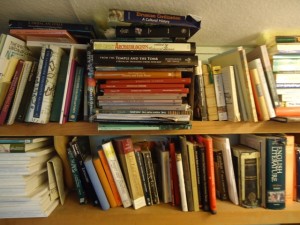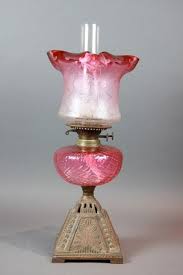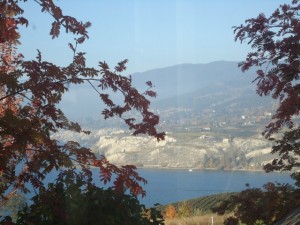Read the introduction to Will Come the Words: Writers & their creative spaces.
BARBARA LAMBERT lives and writes in the Okanagan Valley of British Columbia, Canada.
In the room where for the first time the words did come, I wrote a story when I was eight and got my first rejection slip.
I loved my small room. I could close the door and sit at the desk my father had built for me — three drawers on one side, a curving three-tiered shelf for books on the other. Best of all was my lamp with a rose-coloured shade.
My father knocked down the walls of my room when I was a teenager. He pushed up the dormered attic of our farmhouse and built a double bedroom for my little sister and myself.
The new bedroom had windows looking over Okanagan Lake both north and south.
And though I missed the cozy solitude of my old room, words found their way upstairs too, after a while. So did my next rejection slip. This time from Maclean’s, an actual personal rejection written by Pierre Berton himself.
Then there was the tiny round table in a student apartment looking over Kitsilano rooftops, where the news landed of my first acceptance in a literary magazine, along with a cheque for fifteen dollars. And not much later — when I was a young mother with three children — there was the picnic table in an elbow of our kitchen in Horseshoe Bay, where I pounded an old Underwood typewriter while my little daughter Shaena lay beneath and pounded back with her feet to reclaim my attention. (Happily she now credits her own writing career, in part, to an intoxication with words contracted in those under-the-table hours.)
Over time there were many other desks and quasi desks in rooms of my own, or family-shared. And many more rejection letters — interspersed, occasionally, with a few marvellous bingo! moments.
Then during a year our family spent in Barbados — paradise spliced with personal loss, the death of my mother — one night a cane toad jumped into the room where I was typing. He was a little bigger than a teapot. He plopped across the room and out the patio door, taking all the words with him, for what turned out to be ten years.
At first I was unbelieving. Then I pretended it was a relief to have had the need to express myself banished from my brain — poof! — along with visions of what might be done if I were better, fitter, stronger. Impossible, to write grief.
Back in Canada I gathered some artist friends and we started a textile printing studio. This was an activity so seductively hands-on: the results tactile and (sometimes) lovely, the failures immediately apparent, and a big bank loan to up the stakes; and when we began custom printing on imported silk, enough drama and pity and terror to make Aristotle grit his teeth.
What I write here:
Yet the need to write never really went away — and eventually, as these things happen, the textile experience wove itself into my first published novel. Short stories followed, then a published collection. And considerably later, in a 500-year-old mill house in Italy — at a chunky olive-wood scrittoio in a downstairs room that was once a cattle shed — words stampeded in so recklessly for a while that the first draft of a “simple” Tuscan/Etruscan novel, which would become The Whirling Girl, ran to over a thousand pages.
 Now, my husband and I have moved, permanently, into my childhood home. I’ve reclaimed that upstairs room. Shelves sag with the weight of my Etruscan research books.
Now, my husband and I have moved, permanently, into my childhood home. I’ve reclaimed that upstairs room. Shelves sag with the weight of my Etruscan research books.
And with that novel finally out in the world, here I wait, silent as a raptor — looking out over Okanagan Lake through the inky trace-work of Ponderosa pine — alert to the hesitant rustling of the new words to come.
But first I might make a trip to a second-hand store — search out another lamp with a rose-coloured shade.
My favourite writing quote:
From Dr. Johnson — “Read over your compositions and where ever you meet with a passage which you think is particularly fine, strike it out.”
My creative space online:
(featuring, among other things, a literary Salon des Refusés called “Dr. Johnson’s Corner — a hangout for feisty writers who’ve defied that stern dictum of Dr. J.)
♦ ♦ ♦
Peek into more writers’ creative spaces:
Michelle Berry, novelist
Christy Ann Conlin, novelist
Stephanie Dickison (series intro), food & lifestyles writer, nonfiction author
Gail Gallant, YA novelist
Robert Rotenberg, thriller novelist
Susan Siddeley, memoirist, poet, founder of Los Parronales Writers’ Retreats
Ann Vanderhoof, travel writer
But the essential question is, Have you found a space, that empty space, which should surround you when you write? Into that space, which is like a form of listening, of attention, will come the words, the words your characters will speak, ideas — inspiration. If a writer cannot find this space, then poems and stories may be stillborn.
~ Doris Lessing


Barbara, I didn’t realize that you had returned to your family home, and to your favourite writing space. Wonderful … as is this post.
Well I’m plotting with Allyson to get you and the other CCs out here for a visit before TOO long! Thanks for your lovely comment.
Thank you for sharing your story about you writing space and your writing process, Barbara! How lucky for us that you came back to it!
Thank you Allison. One of the benefits of the “return” is to have you guys living nearby.
My favourite: “Then there was the tiny round table in a student apartment looking over Kitsilano rooftops, where the news landed of my first acceptance in a literary magazine, along with a cheque for fifteen dollars.”
Oh my!! Kitsilano rooftops AND fifteen dollars. [I’d have been happy with one or the other.] I can imagine some serious jumping up and down followed…
A lovely piece!
Thanks Carin — “serious jumping up and down” and then the purchase of a bottle of Chianti (you could still get them in those straw baskets in those days) and a length of farmer’s sausage and a french loaf sliced into garlic bread — and the loaf became fishes and the party began!
The part about the desk your father built reminded me of a piece I read somewhere by Margaret Lawrence about the desk her father built her when she was a child: how many years later she realized it was a gift of the depression, built from scraps because they had no money; how it was the gift she loved most of all through childhood and even later.
And, may I also say I was full of admiration at your youthful courage sending submissions to McLean’s magazine!
Last, but not least, the cane toad and the loss of writing to grief! I have experienced both, though not together, and your description and the juxtaposition are truly marvellous.
Elizabeth, thanks for your lovely comment (on so many levels). So heart-warming to hear what you have to say.
Do want to hear about that cane toad sometime!